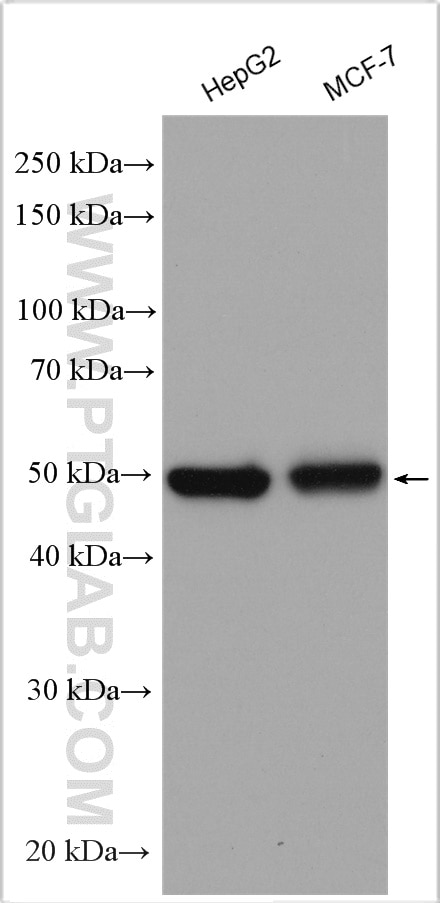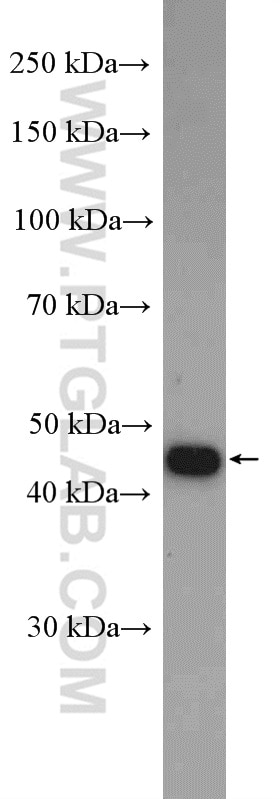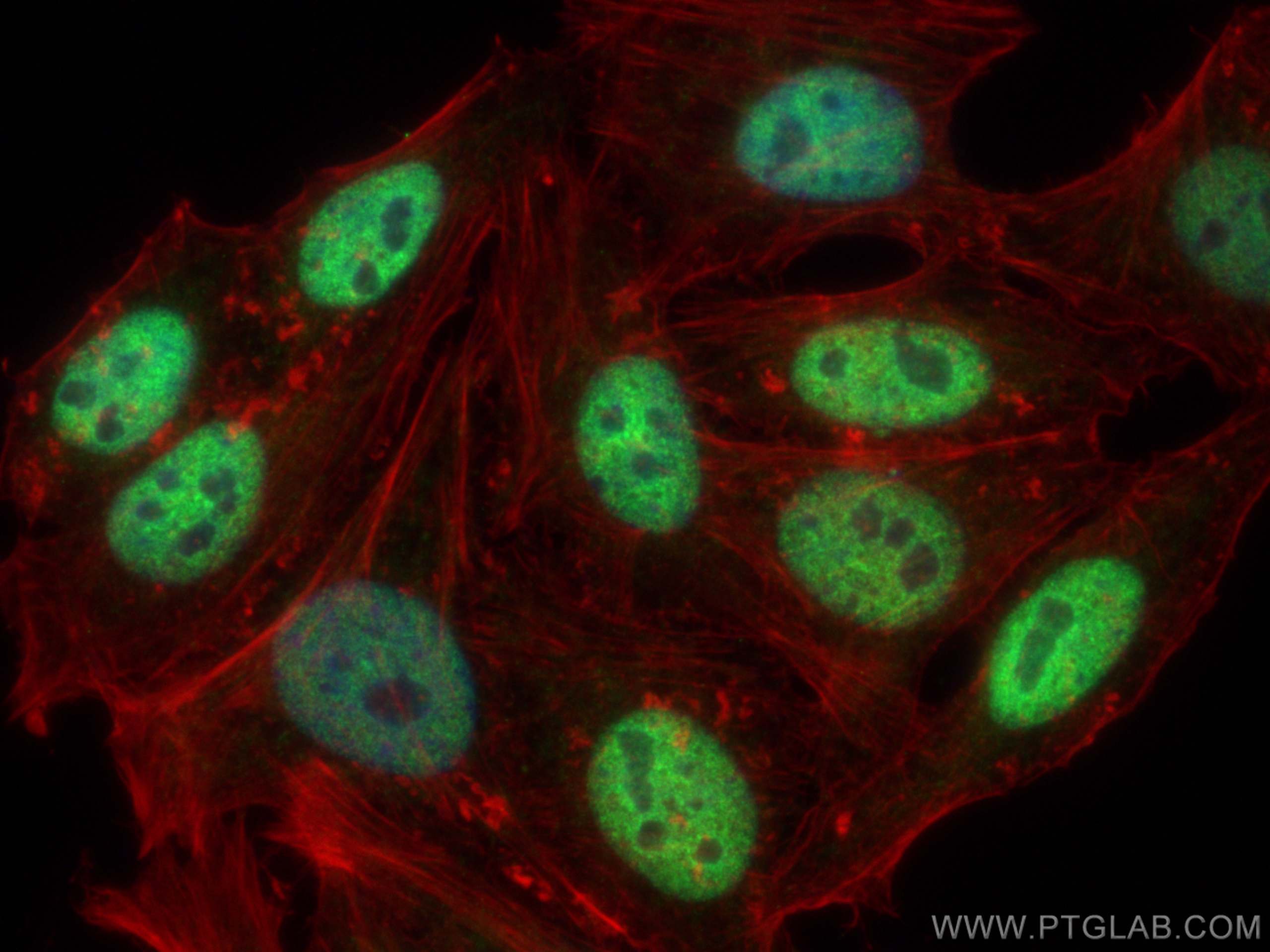- Featured Product
- KD/KO Validated
TFAP2A,AP-2 Polyklonaler Antikörper
TFAP2A,AP-2 Polyklonal Antikörper für WB, IF/ICC, ELISA
Wirt / Isotyp
Kaninchen / IgG
Getestete Reaktivität
human und mehr (1)
Anwendung
WB, IF/ICC, IP, ChIP, ELISA
Konjugation
Unkonjugiert
Kat-Nr. : 13019-3-AP
Synonyme
Galerie der Validierungsdaten
Geprüfte Anwendungen
| Erfolgreiche Detektion in WB | HepG2-Zellen, MCF-7-Zellen, Y79-Zellen |
| Erfolgreiche Detektion in IF/ICC | HepG2-Zellen |
Empfohlene Verdünnung
| Anwendung | Verdünnung |
|---|---|
| Western Blot (WB) | WB : 1:2000-1:10000 |
| Immunfluoreszenz (IF)/ICC | IF/ICC : 1:50-1:500 |
| It is recommended that this reagent should be titrated in each testing system to obtain optimal results. | |
| Sample-dependent, check data in validation data gallery | |
Veröffentlichte Anwendungen
| KD/KO | See 1 publications below |
| WB | See 3 publications below |
| IP | See 1 publications below |
| ChIP | See 4 publications below |
Produktinformation
13019-3-AP bindet in WB, IF/ICC, IP, ChIP, ELISA TFAP2A,AP-2 und zeigt Reaktivität mit human
| Getestete Reaktivität | human |
| In Publikationen genannte Reaktivität | human, Maus |
| Wirt / Isotyp | Kaninchen / IgG |
| Klonalität | Polyklonal |
| Typ | Antikörper |
| Immunogen | TFAP2A,AP-2 fusion protein Ag4112 |
| Vollständiger Name | transcription factor AP-2 alpha (activating enhancer binding protein 2 alpha) |
| Berechnetes Molekulargewicht | 431 aa, 47 kDa |
| Beobachtetes Molekulargewicht | 47 kDa |
| GenBank-Zugangsnummer | BC017754 |
| Gene symbol | TFAP2A |
| Gene ID (NCBI) | 7020 |
| Konjugation | Unkonjugiert |
| Form | Liquid |
| Reinigungsmethode | Antigen-Affinitätsreinigung |
| Lagerungspuffer | PBS mit 0.02% Natriumazid und 50% Glycerin pH 7.3. |
| Lagerungsbedingungen | Bei -20°C lagern. Nach dem Versand ein Jahr lang stabil Aliquotieren ist bei -20oC Lagerung nicht notwendig. 20ul Größen enthalten 0,1% BSA. |
Hintergrundinformationen
The activator protein-2 (AP-2) family of transcription factors comprises five 52-kDa isoforms (AP-2α, AP-2β, AP-2γ, AP-2δ, and AP-2ε), which share a common structure: a proline/glutamine-rich transactivation domain in the N-terminal region and a helix-span-helix domain in the C-terminal region, which mediates dimerization and site-specific DNA binding. Depending on the cellular context, the AP-2 transcription factors are individually associated either with cell differentiation and development or with cancer progression/regression (PMID: 21966377). TFAP2A (AP-2-alpha) is the only AP-2 protein required for early morphogenesis of the lens vesicle. Together with the CITED2 coactivator, stimulates the PITX2 P1 promoter transcription activation (PMID: 11694877).
Protokolle
| Produktspezifische Protokolle | |
|---|---|
| WB protocol for TFAP2A,AP-2 antibody 13019-3-AP | Protokoll herunterladen |
| IF protocol for TFAP2A,AP-2 antibody 13019-3-AP | Protokoll herunterladen |
| Standard-Protokolle | |
|---|---|
| Klicken Sie hier, um unsere Standardprotokolle anzuzeigen |
Publikationen
| Species | Application | Title |
|---|---|---|
Oncol Rep Regulation of DEK expression by AP-2α and methylation level of DEK promoter in hepatocellular carcinoma. | ||
Acta Pharmacol Sin Hepatitis B virus X protein promotes human hepatoma cell growth via upregulation of transcription factor AP2α and sphingosine kinase 1.
| ||
Cell Death Dis TFAP2A potentiates lung adenocarcinoma metastasis by a novel miR-16 family/TFAP2A/PSG9/TGF-β signaling pathway. | ||
Cell Death Dis The m6A modification-mediated OGDHL exerts a tumor suppressor role in ccRCC by downregulating FASN to inhibit lipid synthesis and ERK signaling | ||
Int Immunopharmacol miR-1293 suppresses osteosarcoma progression by modulating drug sensitivity in response to cisplatin treatment | ||
Commun Biol Macroscopic inhibition of DNA damage repair pathways by targeting AP-2α with LEI110 eradicates hepatocellular carcinoma |
Rezensionen
The reviews below have been submitted by verified Proteintech customers who received an incentive for providing their feedback.
FH Alessandro (Verified Customer) (12-09-2023) | good IF antibody. no unspecific staining
|




